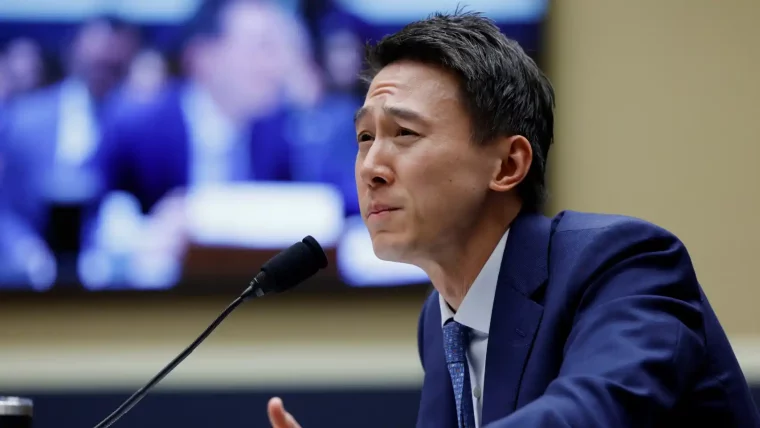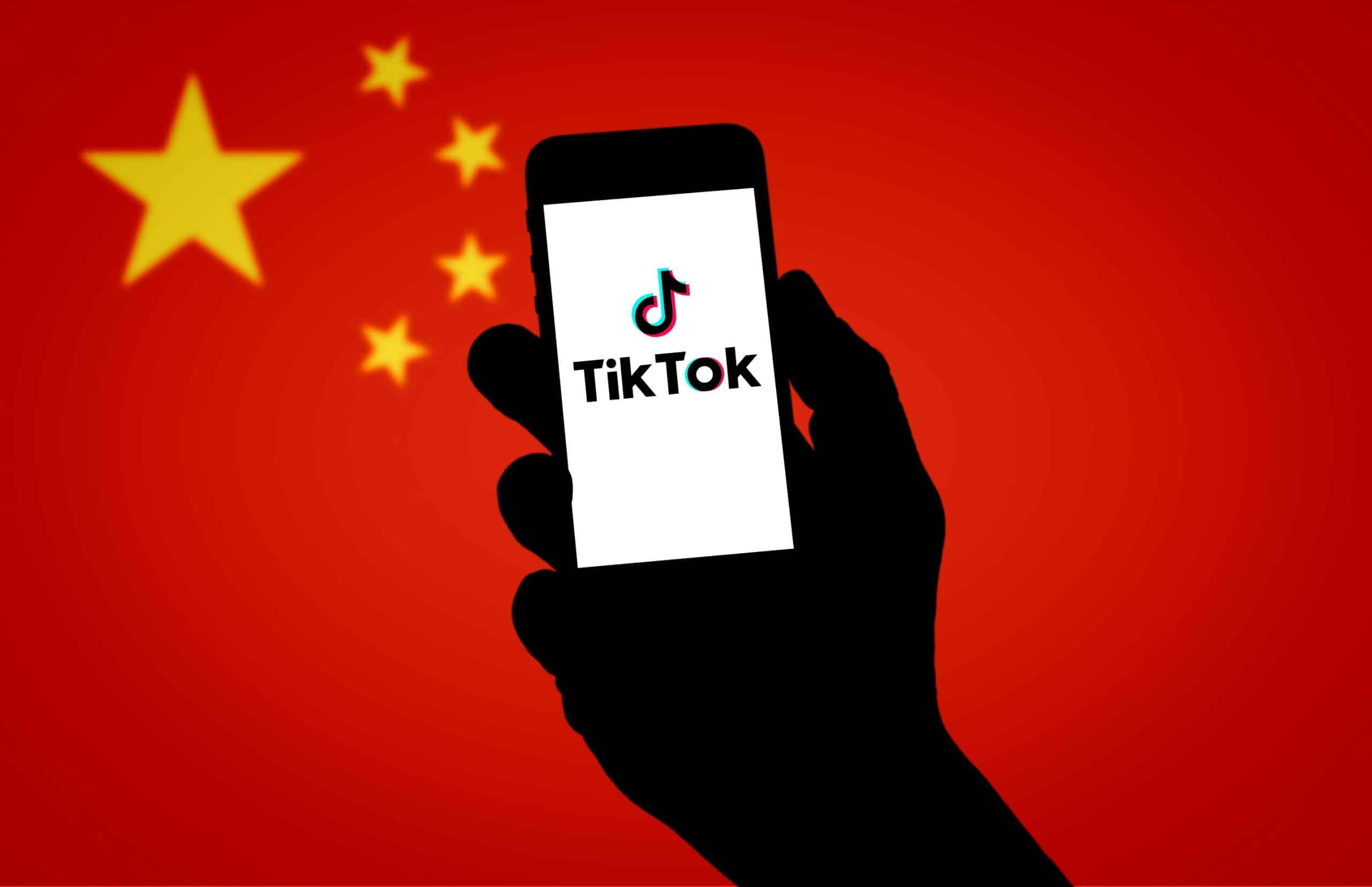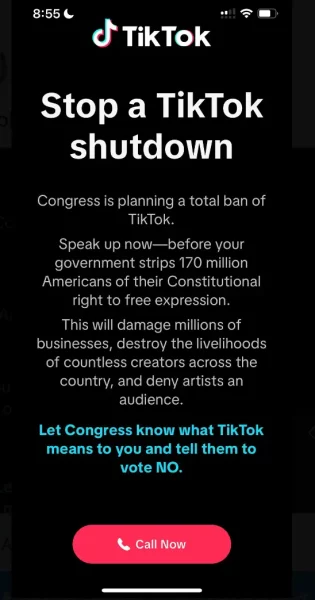The incredibly popular social media app TikTok is facing its biggest threat yet from US lawmakers who seem to be determined to shut it down over national security concerns regarding its ties to the Chinese government.
A new bipartisan bill introduced this week would force TikTok’s parent company, ByteDance, to sell off the app’s US operations or face an outright nationwide ban placing it off-limits on all American devices.
Dubbed the Protecting Americans from Foreign Adversary Controlled Applications Act, the legislation gives ByteDance 180 days to divest itself of TikTok and any other apps under its control.
The Bill Threatening Gen Z’s Favorite App
Representative Mike Gallagher (R-WI) summed up his and his colleagues’ reasoning behind the bill, saying,
“America’s foremost adversary [the CCP] has no business controlling a dominant media platform in the United States. TikTok’s time in the United States is over unless it ends its relationship with CCP-controlled ByteDance.”
The proposed measures – which have drawn support from the White House – represent Congress’s most aggressive step thus far in targeting TikTok amid longstanding fears that the immensely popular app will be forced to share US user data with Beijing for intelligence purposes.
While TikTok denies any such sharing has occurred, US officials warn that China’s laws can be used to compel the company to hand over the trove of personal information it collects and stores from US-based users at any time. This is likely true because of Xi Jinping’s 2017 national intelligence law which requires all individuals, organizations, and companies to assist in national intelligence work when requested.
It’s important to note that TikTok is right that there is no evidence that it has shared US user data with the CCP, though the CCP would likely be smart enough to avoid a paper trail if it had requested data.
“If you value your personal freedom and privacy online, if you care about Americans’ national security at home, and yes, even if you want TikTok to stick around in the United States, this bill offers the only real step toward each of those goals”, Gallagher argued. “It provides the only path for the app to continue its operations in the US without threatening Americans’ online freedom, privacy and security.”
More Details on the Proposed Bill that Could Result in a TikTok Ban
If passed and signed into law, the bill would:
- Give ByteDance 180 days to fully divest TikTok and other affiliated apps, with all US operations and data transferred to a new American-owned company outside of Chinese control. If the company fails to do so, the apps would become illegal to download or use within the United States.
- Empower the federal government to keep identifying and potentially prohibiting foreign adversary-controlled apps posing national security risks even beyond TikTok’s ownership situation.
- Allow the US to block problematic apps from being carried across internet hosting services, impacting companies beyond just the app stores run by Apple (AAPL) and Google.
The bill advanced quickly through the House’s Energy and Commerce Committee on Thursday in a unanimous 50-0 bipartisan vote, reflecting the depth of lawmakers’ concerns over TikTok’s privacy and national security from both parties. It is now headed to the full House floor as soon as next week.
“Today, we will take the first step in creating long-overdue laws to protect Americans from the threat posed by apps controlled by our adversaries, and to send a very strong message that the US will always stand up for our values and freedom”, said Rep. Cathy McMorris Rodgers (R-WA), the committee’s chair.
However, the legislation still faces an unclear path forward in the Senate. While the Biden administration has provided technical assistance in drafting the House bill, White House Press Secretary Karine Jean-Pierre said “it still needs some work” before they could fully endorse it.
TikTok Pushes Back Hard, Prompts Users to Call Lawmakers to Stop the Ban
TikTok, which reportedly has over 170 million active American users, is pushing back ferociously against a bill that supposes an “outright ban” that would unconstitutionally silence millions of voices.
Our statement on the latest TikTok legislation: This bill is an outright ban of TikTok, no matter how much the authors try to disguise it. This legislation will trample the First Amendment rights of 170 million Americans and deprive 5 million small businesses of a platform they…
— TikTok Policy (@TikTokPolicy) March 5, 2024
“This legislation will trample the First Amendment rights of 170 million Americans and deprive 5 million small businesses of a platform they rely on to grow and create jobs”, the company stated.
This week, TikTok began to prompt some users with in-app alerts urging them to “speak up now” by calling their representatives to oppose the legislation before “your government strips 170 million Americans of their Constitutional right to free expression.”
Those messages appear to have sparked a tsunami of phone calls flooding Congressional offices, with some reportedly shutting down phone lines due to the deluge. Rep. Gallagher accused TikTok of trying to “intimidate” lawmakers into voting against the bill.
While sponsors insist that the bill does not constitute a full ban since TikTok could continue operating under new ownership, TikTok flatly rejected that notion: “This legislation has a predetermined outcome: a total ban of TikTok in the United States.”
Civil liberties groups like the ACLU have also raised objections that banning or restricting TikTok would violate free speech rights. The tech industry’s main trade association warned that the bill “would infringe the First Amendment rights of private businesses, including app stores, to curate and display content they believe is appropriate for their communities.”
Security Risks Cited as Justification for a Ban Have Not Yet Been Proven
For years, US officials across administrations from both parties have warned about the hypothetical risks of TikTok’s Chinese ownership enabling data harvesting and censorship, disinformation campaigns, and even outright spying by Beijing’s authoritarian government.
While no clear public evidence has emerged of such activities, officials keep arguing that ByteDance could be compelled under Chinese laws to facilitate espionage or influence operations targeting Americans through TikTok.
“Through this access, the app is able to collect nearly every data point imaginable, from people’s location, to what they search on their devices, who they are connecting with, and other forms of sensitive information”, warned Rep. Cathy McMorris Rodgers about the dangers posed by the app to the United States national security.
Multiple states have already banned TikTok from government devices, with the federal government enacting similar prohibitions. Montana even passed a bill to ban the app from app stores in the state entirely. However, a federal judge temporarily blocked Montana’s statewide ban, deeming it overly broad and threatening free speech.
The new legislation’s national security focus may help withstand legal scrutiny compared to broad statewide bans, its backers claim. “It is focused entirely on foreign adversary control—not the content of speech being shared”, states a factsheet circulated by the bill’s co-sponsors Gallagher and Rep. Raja Krishnamoorthi (D-IL).
A report published by the New York Times in 2020 highlighted that the Central Intelligence Information (CIA) found no evidence that Chinese intelligence services were able to access the app or its databases. Then again, it’s hard to imagine that the CCP would leave a paper trail if it was accessing TikTok data, leaving lawmakers stuck between a rock and a hard place.
Can TikTok Really Be Banned? This is What Needs to Happen Next in Congress

House approval of the TikTok restrictions now seems likely, with Speaker Mike Johnson voicing support and Majority Leader Steve Scalise fast-tracking a floor vote next week. However, the bill’s future remains murky in the Senate where no direct companion legislation yet exists.
Sen. Maria Cantwell (D-WA), who chairs the influential Commerce Committee with jurisdiction over the issue, has not committed to advancing the House bill. “I will be talking to my Senate and House colleagues to try to find a path forward that is constitutional and protects civil liberties”, she told CNN.
The path may also hinge on ByteDance’s next strategic moves. Some US officials still hope that the Chinese firm agrees to divest TikTok rather than face an outright ban in the country. Doing so could resolve the festering national security cloud without the need to settle broader free speech controversies raised by restricting the platform’s availability.
For ByteDance though, such a sale could undermine its closely guarded algorithms that fuel the addictive feed experience tailored specifically to each user. Competitors like YouTube would likely pay billions to acquire that data-backed technology powering TikTok’s virality and elevated engagement levels.
In an ironic twist, President Biden’s own re-election campaign has embraced TikTok to reach younger voters despite his administration backing legislation to ban the app over security fears. The White House has sought to thread that needle by arguing it’s working to “meet the American people where they are” while still confronting TikTok and its perceived threat.
Whether that Potomac two-step holds up may ultimately depend on ByteDance’s choices and Congress’s ability to bridge partisan divisions once the TikTok bill reaches the Senate.
With over a third of Americans now being active on TikTok, Washington could face a backlash from voters if their access to the cultural phenomenon gets yanked thanks to the tech lash over data privacy concerns.

